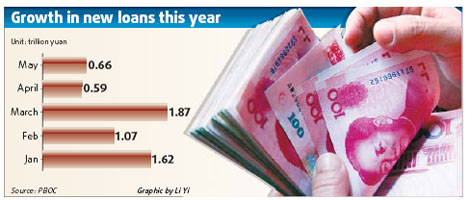
|
CHINA> National
 |
|
Industrial output rebounds in May
(China Daily)
Updated: 2009-06-13 10:43 China's factory output growth rebounded more than expected in May alongside stronger expansion in credit and consumer spending, bolstering evidence that the world's third-largest economy is on the path to recovery.  The figures, which round out a batch of monthly data that has mostly surprised on the upside, suggest that the government's huge stimulus spending and tax breaks to encourage purchases of everything from cars to home appliances are helping to offset continued weakness in exports. The acceleration in annual industrial production growth, to an eight-month high of 8.9 percent from 7.3 percent in April, beat economists' forecasts of 7.5 percent. Retail sales grew by 15.2 percent in the year to May, also topping forecasts and up from growth of 14.8 percent in April. Together with the uptick in new domestic-currency lending in May, to 664.5 billion yuan compared with 592 billion yuan in April, the data paints a picture of an economy pulling up from a bottom. Despite the generally strong data, Liu Mingkang, head of the China Banking Regulatory Commission, cautioned that China needs to ask whether the positive signs in the economy are for real, with questions about the recovery in the real estate sector. Still, Liu told a financial forum in Beijing on Friday that banks remained sound, even as lending soars. Banks extended a total of 5.84 trillion yuan of local-currency loans in the first five months of the year, a record amount that easily topped the government's minimum target of 5 trillion yuan for the whole year. "We mainly care about quality now. As long as the quality is good, there should be no problem if the speed is a little bit high," Liu said. Markets took the strong loan data as a positive for banks. Shares in China Construction Bank initially soared 5.7 percent, later paring some of gains to trade up 4.2 percent. Industrial and Commercial Bank of China was up 3.1 percent. "Without window guidance from the regulator, new loans will continue to grow quickly, driven mainly by smaller lenders, while in earlier months, loans were mainly from big banks," said Lu Zhengwei, chief economist with Industrial Bank in Shanghai. While retail sales growth, the closest proxy for consumer spending, maintained considerable momentum, a survey released by the central bank showed a record number of urban residents now prefer to save their money than spend it. The survey, conducted in late May, showed that just 3.4 percent of urbanites were optimistic their incomes will rise in the future, down 14.3 percentage points from the first quarter. Some 47 percent of respondents would now like to save more, up 9.5 percentage points on the first quarter, and the highest since the survey began in 1999. Reuters |